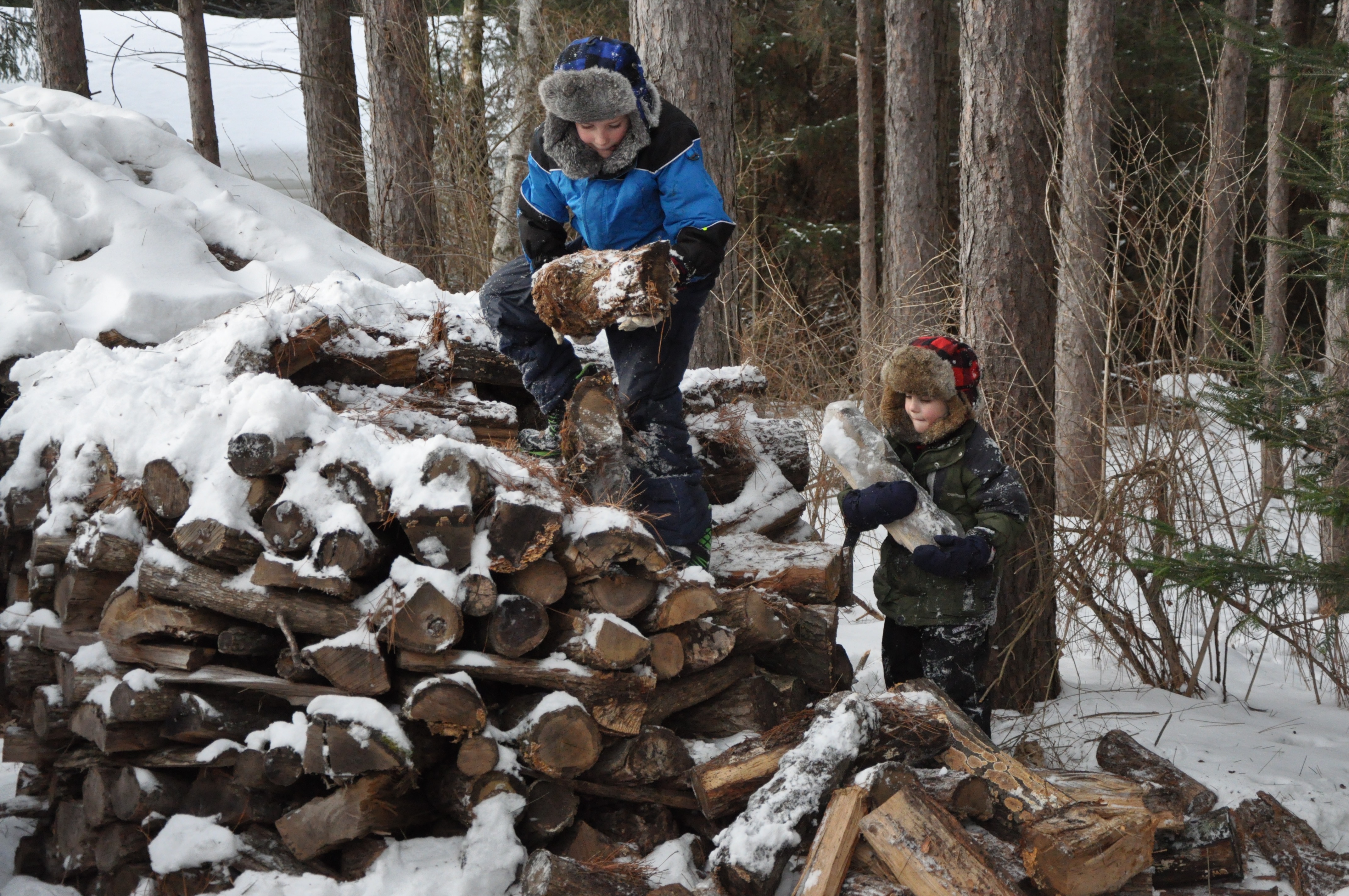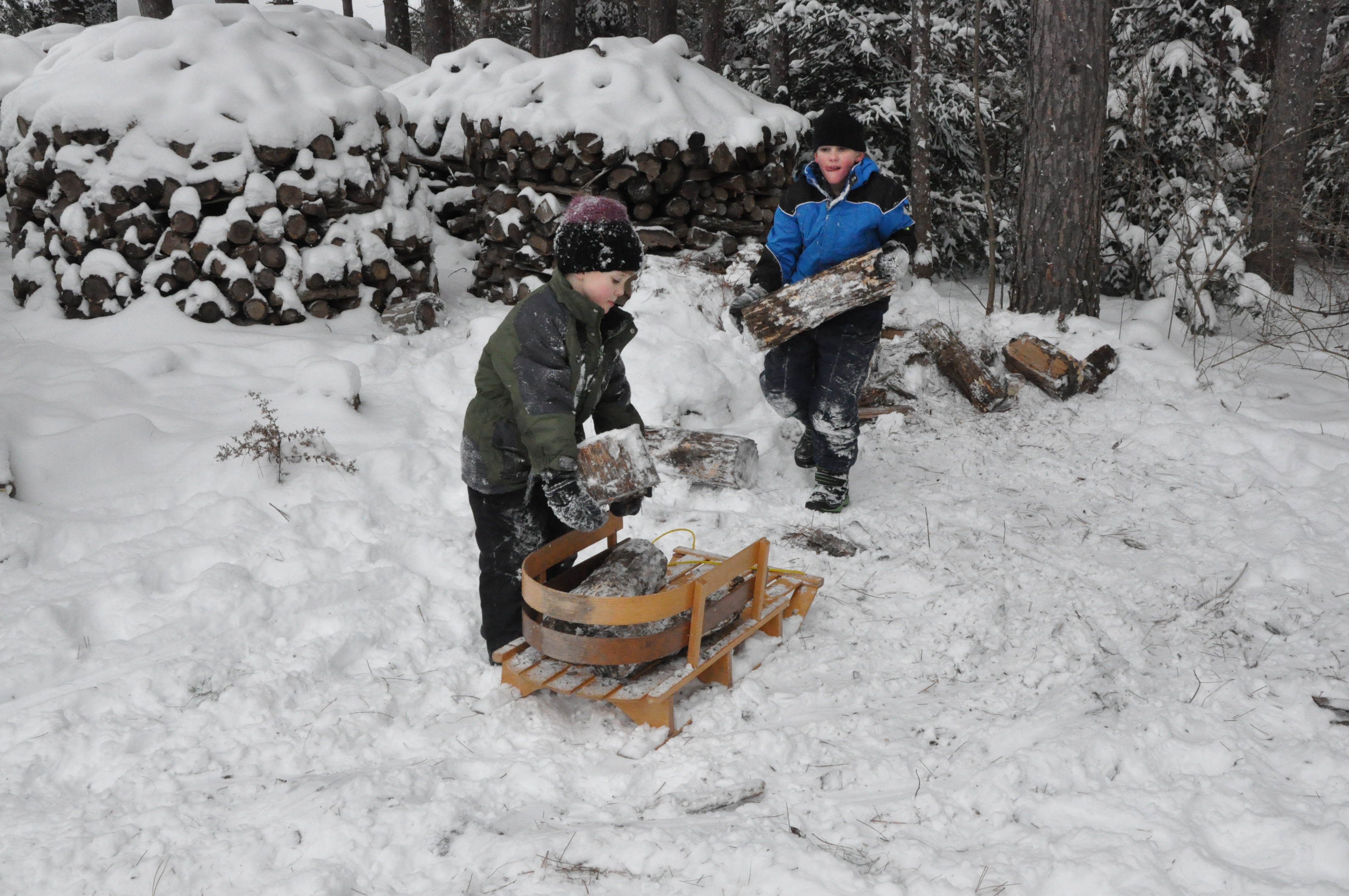Wood heat … simple. The process in getting those snow-soaked logs stacked in the basement … less so.
Likewise, the first time I and my three children (those old enough to toss a log of firewood) set out to fill our basement, the goal was simple enough: stack wood in the basement. The process proved less so—break loose the frozen logs, stack them on our wooden sled, slide them across the yard, push them down the chute to our basement, and stack them in the basement. Simple enough, it would seem.
But, human nature turned up. “Topping” proved the most enjoyable, and so got done the quickest. “Hauling” turned out to be the most tedious, and so barely got done at all. After hands froze, nobody wanted to work outside. And, the job took too long and only got done after I’d schnertzed a bit at everybody.
At our second attempt, more recently this winter, we rethought the matter—match our strengths to our roles, but then use our strengths to help each other. Seven year-old Henry topped. I hauled and carried, of course. Ten year-old Jack pushed logs down the chute. Almost-teenager Katja stacked the wood. If one got ahead of the other, he or she would slide other to cover the other’s weakness. We caught a rhythm and found freedom in relationship. The wood got stacked, and we got warm, in the end. This was love and service in the Northwoods world of necessity.

This week at Woodland, we are, at long last, come to Paul the Apostle’s discussion of relationships in light of the Gospel. What does freedom look like in relationships?
As in last week’s passage, we will ” … keep in step with the Spirit” (5.25). But, relational freedom involves others. And, walking in the Spirit with others in mind turns out to involve the giving up of “conceit” (5.26, ESV). Paul’s qualifiers show us that conceit involves the person who “provokes” another—the kind of man who positions himself in the right circles, so as to guard his turf. Appearing to have a high self-esteem, this man really lives in bondage to the way he feels others think of him. Conceit, likewise, involves the other sort of person who envies—the kind of woman who feels ill-will toward the advantage of others. Having low self-esteem, this woman (or man) holds a grudge, so as to avoid releasing her claim on those who have hurt her. Both kinds of people live in dependence to what others think of them. Neither is free to love and serve. Both live under “law”.
By contrast, freedom in Christ means that we no longer depend on other people to validate us. Instead, we depend on Christ, and His Spirit helps us love and serve without fear. Bear one another’s burdens, and so fulfill the law of Christ (6.2). Freedom in relationship then involves restoring one another, resting in Christ’s sufficiency, and remembering that God’s opinion of us is all that matters. Freedom in relationship, likewise, involves freedom to love and serve generously … for whatever one sows, that will he also reap (6.7).
Freedom in relationship looks like freedom to love and serve fearlessly and generously in the power of the Spirit.
At the end of the day (pictured, I believe, by the “load” of 6.5, the judgment or opinion of God), only the opinion of God regarding our lives matters. Refusing to be in bondage to either the praise or criticism of others opens vistas of freedom for love and service. When we walk by the Spirit we’re able to go on with Christ in our relationships with other without fear, because God’s opinion matters more than that of other people.
Find a friend or small group and consider these questions:
What are some concepts in our study of Galatians thus far that have “pushed” you, in either your understanding of the Christian life or your ability to live them out?
Are any of these ideas unclear to you?
Have you ever thought of the idea of “conceit” as involving both inflated self-esteem and low self-esteem? What common root do you find in both of these social sins?
Why is there freedom in considering God’s opinion of me once I’ve trusted in Christ? How is this the opposite of “conceit”?
Where have you, personally, found freedom in your life as a result of considering the opinion of God? How has this freed you to love and serve without fear?
How does “bearing one another’s burdens” fulfill the Law of Christ?
Where do you need to love and serve as a result of your freedom in relationship?



